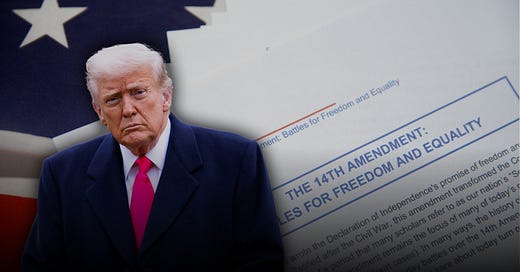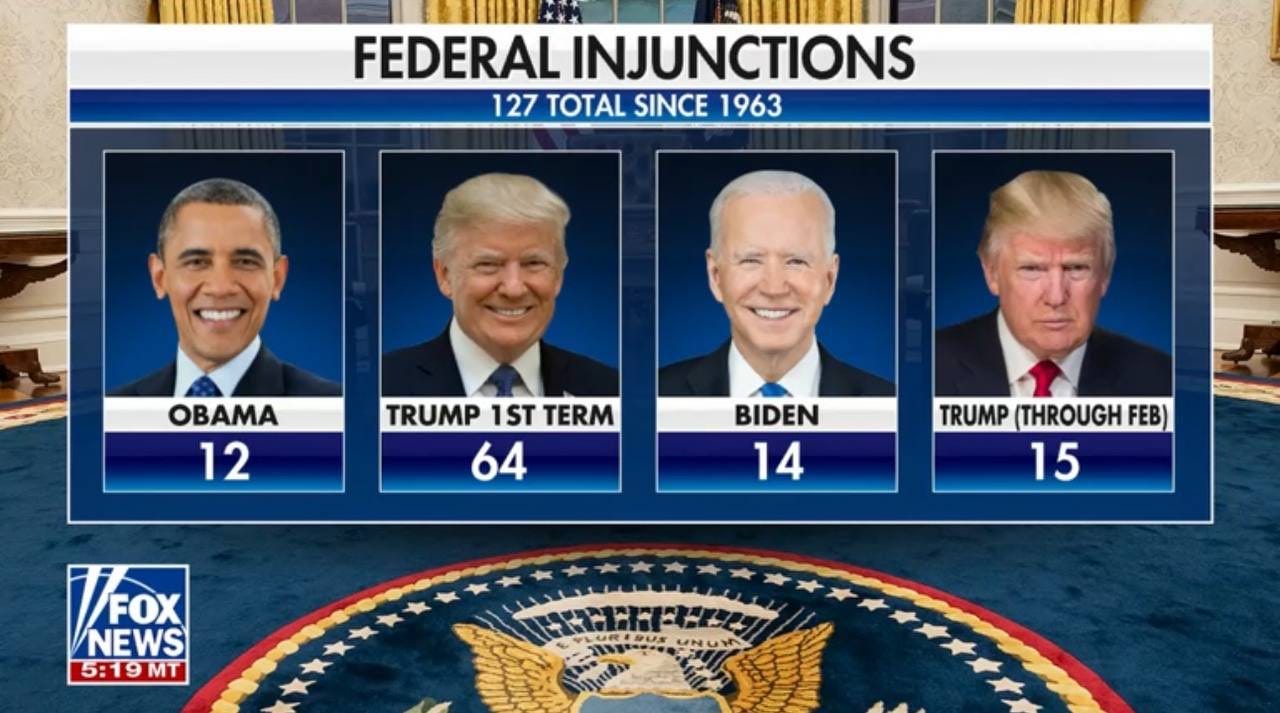Although President Trump and White House Border Czar, Tom Homan have brought catch-and-release to an end, and Southern Border apprehensions to a historic low, the promised levels of mass deportations have begun to slow.
The Administration is trying to remove foreign criminals and members of cartels designated terror organisations using the Alien Enemies Act of 1798: which gives the President the authority to detain and deport actors working at the behest of foreign states. Tren de Aragua, a Venezuelan prison gang responsible for occupying apartment blocks and murdering American citizens after being let in by the Biden Administration, entered via the Southern Border after Venezuelan President Nicolas Maduro evicted them from Tocorón Prison.
During a military flight chartered for El Salvador, intending to deposit the gang members in one of President Bukele’s supermax prisons, US district judge James Boasberg ordered the flight be turned around and return the foreign criminals to the United States. The flight continued to El Salvador anyway.
However, Boasberg’s intervention has put a pause on the President exercising his powers under the Alien Enemies Act — meaning a district judge now has ceded himself the power to command the military, over and above the elected Commander In Chief. Checks and balances are no longer reciprocal, but hierarchical: with the Judicial branch placing itself above the Executive.
, and I discussed this Constitutional crisis, and why unelected Deep State operatives feel entitled to frustrate the mandate of a democratically-elected President on behalf of “Democracy”, on The Weekly Wrap.Watch the full episode on YouTube or on Courage Media.
As I wrote in a previous essay, the ideology of liberal progressivism makes these anti-democratic interventions not only justified, but necessary:
What we must understand is that “democracy” to Democrats means something very different than one man, one vote. As Emily Finley explains in The Ideology of Democratism, those who exalt democracy as a shared ideal are “enchanted with an imaginative vision of democracy that at times is almost indistinguishable from religious belief”. The way Democrats speak of democracy when criticizing Donald Trump is akin to worshipping it as a good until itself; rather than preferring it as a process by which political representatives are selected with maximum accountability.
Democracy is premised on the belief that human beings share an egalitarian nature, and are equipped with rational faculties to reach the same conclusion about what is in their best interest. Therefore, mass enfranchisement will produce a uniform, predictable, progressive outcome. Hence why Democrats abhor anyone imposing identity verification requirements, proof of citizenship, civics tests, or other criteria on access to voting.
This belief in an egalitarian human nature is derived from the Enlightenment. […]
For Hobbes, man’s state of nature was bellum omnium contra omnes: a war off all against all, driven by libido dominandi — a desire for conquest, and to avoid death. He advocated an absolute sovereign be given power to arbitrate all disputes, and to “reduce all their wills by plurality of voices unto one will; which is as much as to say, to appoint one man or assembly of men to bear their person”. This subjugation of competing visions of the good under one appears to be the origin of the idea of representative governance.
Locke, the favored philosopher of America’s founders, stated all men originated in “a state of perfect freedom” and “perfect equality, where naturally there is no superiority or jurisdiction of one over another”. Man left this state of nature to construct a state by consensus, compromising on some of his freedom to protect private property, and sacrificing equality to reduce material privation. The state and culture exist in an antagonistic relationship with individual citizens, for whom any limit on their freedom of will constitutes oppression.
This evolution in liberal thought led to Rousseau, who conceived of man’s state of nature as a Garden of Eden where individuals sated their appetites wholly independent of relationships with one another. They had material abundance and were free from responsibilities — until “The first man who, having enclosed a piece of ground, bethought himself of saying This is mine” ruined it for everyone. Rousseau believed “that man is naturally good and that it is from [our] institutions alone that men become wicked”. If only a state with unrestricted jurisdiction, working in the presumed best interest — the “General Will” — of everyone, could confiscate property, to hold all in common, we would remember how we were once all free and equal again.
What all three thinkers share is the belief that human beings are tabula rasa — blank slates, onto which education, economic circumstances, culture, and institutions transcribe beliefs and behaviors. The horrors of the Holocaust, and legislative victories of the Civil Rights movement, made this human egalitarianism the de facto cultural assumption in America. From this anthropology do Democrats derive both their unending crusade of antiracism, and their mandate to accrue more powers to the federal government to act on behalf of American citizens. Progressivism, then, is the use of technology, culture, and state power to reduce the limits placed on the freedom of the individual by material conditions and social bonds. What we are progressing toward is a reversion to the State of Nature, in which we were all free and equal — in the imagination of Democrats.
Democracy, then, to Democrats, means: the system by which man’s free and equal nature is revealed to him, and expressed in identical fashion. As such, voting in a democracy is thought to be an exercise of everyone making the same choice over and over.
Read the rest of the essay on Courage Media.
Emily Finley, in her book Ideology of Democratism (2022) elaborated on this:
It seemed to me that this democratic idealism represented a type of enchantment that Max Weber thought had disappeared from the Western imagination. Weber was, of course, correct in the sense that scientific rationality had replaced an earlier Christian and spiritual interpretation of life, but in another sense the world remains very much enchanted. This book argues that the modern Western world is enchanted with an imaginative vision of democracy that at times is almost indistinguishable from religious belief. […]
Democratism’s belief that the people are generally good leads to the idea that the people must only be awakened through some form of enlightenment to their true and rational interests. Then, it is assumed, they will elect leaders representing the policies that correspond with those interests. It is always assumed that the people’s best interests align with those valued by democratism. Politics is a matter of correct reasoning and judgment rather than a moral-ethical challenge, as it was for classical republicans. […]
Based on the liberal anthropology of the Blank Slate, it is presumed that we are all universal standard humans — and that any differences in culture, or inequalities in outcome, are a consequence of either the happenstance of geography or evidence of the hidden-hand of bigotry and oppression.
Given we are all equal in the most fundamental sense, any policies which advance our freedom from consequences and ensure our material equity must be in our rational self-interest. Therefore, any election or executive action which does not result in a victory for progressivism is “anti-democracy”, because it is not in the presumed equal self-interest of everyone.
People would surely only vote against liberal progressivism if they have been led astray by “divisive" rhetoric”, “racism”, or “misinformation”, spewed by “demagogues” like Donald Trump? So all those working on behalf of “democracy” need to do is suppress, censor, and silence those figures, for “democracy” to triumph.
This is why the boundaries of debate in “democracies” are stringently policed by the faceless bureaucrats of unelected government bodies, intelligence agencies, taxpayer-subsidised “experts” and “stakeholders” (NGOs), and ideologues embedded in Silicon Valley.
As I wrote:
If not exposed to mis- and dis-information peddled by “divisive” populists like Trump, Democrats presume everyone will come to the same progressive conclusion. They believe themselves to be in possession of the means of making policies in everyone’s rational self-interest, based on a presumption of universal human sameness. Populism is the art of returning contentious issues back to the realm of public discussion. Populists are therefore slowing down the rate at which policies which benefit everyone will be enacted. They are casting a kind of spell over the voting public, making them believe they are different and divided. For democracy to prevail, populists must be censored, banned, and persecuted. As Finley writes:
For the democratist, there are no genuine and meaningful differences among people. All of “our values” are finally reconcilable in the values that democratism holds to be true. Democratism leaves little room for diversity with regard to worldview and other important matters. The “shared recognition of universal rights” demands unquestioning acceptance, lest one be considered extreme, Fascist, or, in the language of yesteryear, “an enemy of the people”.
As such, democracy may only function when “experts” can censor those charged with spreading division, racist rhetoric, misinformation, or disinformation. As Bill Clinton’s court philosopher, John Rawls, insisted, the parameters of deliberation in democracy must be tightly regulated to uphold the liberal values credited with producing it. This means persecuting anyone not committed to the fiction that, due to their nature, human beings will produce exactly the same outcomes, and that inequality means oppression happened somewhere along the way — requiring government intervention to correct it.
Read the rest of the essay on Courage Media.
wrote in his book The Total State (2024) about how this egalitarian democratic ideology renders the Constitution either an obstacle to be circumvented, or a tool to be selectively enforced to enact progressive ends:People are not machines even if your average political scientist or bureaucrat would like to treat them that way, and neither are the governments they create. Those who treat governments like machines make fundamental errors as to how and why political events take place.
The magic of mixed government is not contained in the fact that three is some kind of special number that creates a stable pyramid of state. Three, five, seven branches—the number is not as important as what they represent. In the last chapter, we learned from de Jouvenel that competing spheres of social inf l uence are what hold the natural expansion of government at bay.
Thus, the only thing that can moderate this expansion is other social forces that command the loyalty of the citizenry. […]
Without a similar basis for both logic and morality, no shared culture can be formed. This is why de Maistre says what makes a nation or a people cannot be captured on paper. Written laws may be a necessary evil, but we should not assume that simply because something is on paper it becomes inviolable. It can be quite the oppo-site. Relying too heavily on a written constitution simply incentivizes a nation’s leaders to become skilled at twist-ing and shaping language in order to circumvent the restrictions created by the formal meaning of its words.
It’s not just in the US — as
wrote in his 2018 book, National Populism:when it was announced that Britain would hold a national referendum on whether or not to stay in the club in 1975, many liberal-minded elites felt uncomfortable, deploying arguments against giving the people a say that were similar to those used by nineteenth-century conservatives to oppose giving people the vote. This was reflected best in remarks on Britain’s vote by Jean Rey, ex-President of the European Commission, in 1974: ‘A referendum on this matter consists of consulting people who don’t know the problems instead of consulting people who know them. I would deplore a situation in which the policy of this great country should be left to housewives. It should be decided instead by trained and informed people.’
Democracy is administered at every stage to steer the voting public toward the outcome presumed to be in the self-interest of universal humanity. Hence why the ruling political establishment sees no contradiction between censoring speech, cancelling elections, persecuting political opponents, outsourcing the business of government to unelected bureaucrats, and “defending democracy”.
Of the 127 total Federal Injunctions against sitting Presidents since 1963, 64 were against Donald Trump during his first term, and fifteen have already been launched against Trump within the first two months of his second term.
This is blatant ideological bias being weaponised by the Judicial branch.
One of the Executive Orders that malignant NGOs and activist judges have frustrated with lawfare is President Trump’s repeal of birthright citizenship.
In a two-part essay series for Courage Media, I explained the legal justification and cultural necessity for correcting this misreading of the Fourteenth Amendment and anachronistic conception of citizenship as conferred by merely being on a nation’s soil, regardless of legality.
most controversial move was the executive order, “Protecting the Meaning and Value of American Citizenship” — which sought to end birthright citizenship. Predictably, this was blocked by judges. In late February, a 4th circuit court of appeals in Richmond, Virginia rejected the Trump administration’s request for an order to halt a nationwide injunction, issued by a federal judge in Maryland, on a 2-1 vote. Judge Deborah Boardman said in her ruling: “Today, virtually every baby born on US soil is a US citizen upon birth… That is the law and tradition of our country.” Another district court judge in Seattle called the executive order “blatantly unconstitutional” — a ruling which foreshadows the necessity to escalate the matter to the Supreme Court.
The American Civil Liberties Union stretched the definition of “American” to absurdity, in the lawsuit they brought against the Trump administration on behalf of “Immigrant Rights” groups. (It seems only the citizenship of those who enter illegally, without doing the costly paperwork that legal immigrants do to comply with the law , matters to the ACLU.) But belonging to a nation means so much more than simply being in its borders. Here’s why Americans of WASP and immigrant stock alike should support Trump’s efforts to end birthright citizenship.
The text of the order explains that, under the Fourteenth Amendment, a citizen is “a person born in the United States, and subject to the jurisdiction thereof”.
“Among the categories of individuals born in the United States and not subject to the jurisdiction thereof, the privilege of United States citizenship does not automatically extend to persons born in the United States: (1) when that person’s mother was unlawfully present in the United States and the father was not a United States citizen or lawful permanent resident at the time of said person’s birth, or (2) when that person’s mother’s presence in the United States at the time of said person’s birth was lawful but temporary (such as, but not limited to, visiting the United States under the auspices of the Visa Waiver Program or visiting on a student, work, or tourist visa) and the father was not a United States citizen or lawful permanent resident at the time of said person’s birth.”
The disagreement now is whether “jurisdiction” means, as the Department of Justice argues, being subject to the laws of the United States, or just being on its soil (jus soli), within its borders. The Trump administration argues that, because illegal immigrants have not complied with US law, and both tourists and temporary visa recipients receive fewer constitutional rights, neither they or their children are “subject to the jurisdiction” of US law. Citizenship at birth therefore requires one or both parents to be US citizens (jus sanguinis ).
Where does birthright citizenship come from? The Fourteenth Amendment was passed in 1868 to grant freed slaves citizenship after the Civil War. Citizenship was extended to anyone “born or naturalized in the United States” when the Supreme Court ruled, in United States v. Wong Kim Ark, the son of Chinese immigrants born in San Francisco could not be denied re-entry under the 1882 Chinese Exclusion Act. From then on, any child born in America was given citizenship, no matter their parents’ immigration status.
Immigration from Asia was previously banned by the Chinese Exclusion and 1924 Johnson-Reed acts. In 1965, the Hart-Celler Act abolished Johnson-Reed’s national origin preferences for immigrants from the UK and Western Europe. Immigrants from Europe became only 20% of yearly migration after Hart-Celler. Asian immigrants received a large number of Hart-Celler’s family reunification visas. Within ten years, the Asian population of America doubled. Today Asia provides 28% of all immigrants — the most of any continent.
Family reunification visas are not contentious because Asian immigrants do not contribute great things to America; nor because Americans are a uniquely bigoted and unwelcoming people. It’s because they have instead been exploited by illegal migrants, tourists, and temporary visa recipients as a way to gain permanent citizenship after having a child in the US. Through birthright citizenship, this baby becomes an “anchor”: a bargaining chip for the rest of the family to receive citizenship too. This can and is exploited by immigrants from all continents, legal and illegal alike. The most recent Pew Research data found that 250,000 children were born to illegal immigrant parents in 2016. This is no doubt much higher after the record number of Southern Border crossings during the Biden administration.
Listen to this episode with a 7-day free trial
Subscribe to Tomlinson Talks to listen to this post and get 7 days of free access to the full post archives.




















